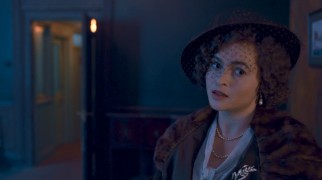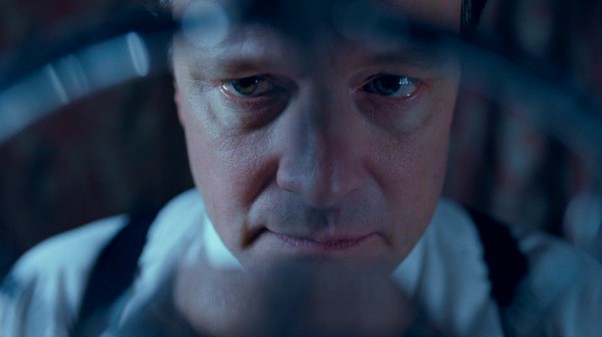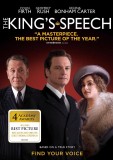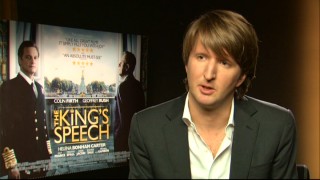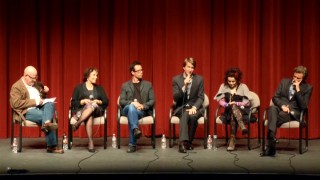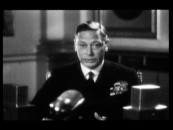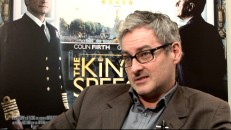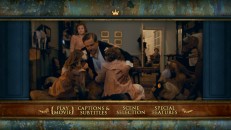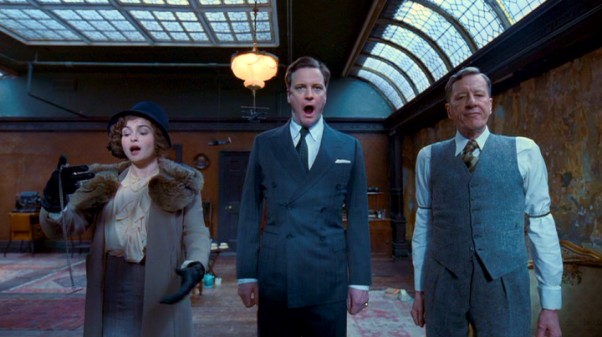The King's Speech DVD Review
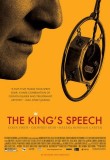 |
The King's Speech
Theatrical Release: November 26, 2010 / Running Time: 118 Minutes / Rating: R / Songs List Director: Tom Hooper / Writer: David Seidler Cast: Colin Firth (King George VI), Geoffrey Rush (Lionel Logue), Helena Bonham Carter (Queen Elizabeth), Guy Pearce (King Edward VIII), Timothy Spall (Winston Churchill), Derek Jacobi (Archbishop Cosmo Lang), Jennifer Ehle (Myrtle Logue), Anthony Andrews (Stephen Baldwin), Claire Bloom (Queen Mary), Eve Best (Wallis Simpson), Michael Gambon (King George V), Freya Wilson (Princess Elizabeth), Ramona Marquez (Princess Margaret), Calum Gittins (Laurie Logue), Dominic Applewhite (Valentine Logue), Ben Wimsett (Anthony Logue), David Bamber (Theatre Director), Roger Hammond (Dr. Blandine-Bentham) |
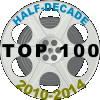 | The King's Speech ranks 61st in our list of the Top 100 Movies of the Half-Decade (2010-2014). |
Buy The King's Speech from Amazon.com: DVD • Blu-ray • Instant Video
In returning Best Picture to a 10-nominee category as it was in the late 1930s and early 1940s, the Academy Awards have quickly obtained the diversity they sought. Among this year's contenders for the top prize, Historically, period pieces have done quite well with the Academy. Prior to this year, five of the six previous Best Picture winners were dramas set in modern times. Of the fourteen winners before those, though, only two (American Beauty and The Silence of the Lambs) were contemporary. In 2010's field, there were five movies set in the past, four of which were based on true stories. Of those four, three barely took us back in time, being set in the 1990s (The Fighter) and mid-2000s (127 Hours, The Social Network). The one exception was the expected winner, The King's Speech, which not only journeyed all the way to the 1930s, but did so with historical figures and a subject of wide-reaching human interest.
The King's Speech dramatizes the life of Britain's previous monarch, George VI, who reigned for just over fifteen years from late 1936 to early 1952. No standard biopic, the film keeps its focus narrowly upon King George's crippling speech impediment, a major obstacle for this authority figure.
At the opening, George (Colin Firth) is Prince Albert Fredrick Arthur George, second in line for the throne. Being Duke of York is enough for George and those around him to wish he could conquer the prominent stammer and stutter that have plagued him from early youth. He meets with various doctors, but their advice (smoking) and treatment (marbles in mouth) are both suspect and ineffective.
On a hunch, George's wife, Elizabeth Bowes-Lyon (Helena Bonham Carter), checks out a speech therapist she finds in the classified ads. Arriving in secret and with much skepticism, George attends a consultation. The therapist, Australian expatriate and amateur actor Lionel Logue (Geoffrey Rush), dispenses with the formalities, addressing the prince as "Bertie" and insisting he is likewise referred to by his first name. In this first appointment, George displays his temper but makes no discernible progress. At least, that is what he thinks until he listens to the recording of himself reading clearly there while classical music blared in headphones.
That is the first breakthrough in the process of self-discovery which defines George's daily sessions with the unorthodox Lionel. Those sessions assume greater significance when George's father, King George V (Michael Gambon), falls ill and when the king's blithesome firstborn son Edward (Guy Pearce) seems unwilling to end his romance with a divorced and remarried American socialite (Eve Best) out of respect to the crown's sacred tradition. When Edward abdicates, stuttering George becomes king, calling heightened attention to Lionel's methods and credentials while Nazi Germany's increasingly distressing actions demand a confident, unwavering voice of the people.
Winning not only Best Picture, but also Best Director for Tom Hooper, Best Actor for Colin Firth and Best Original Screenplay for David Seidler, there is no question that the Academy thought more highly of The King's Speech than any other 2010 film (the night's Best Picture montage, in which all of the other films were weaved into the King's climactic speech, made that very clear). That is understandable, with this drama being most in line with Oscar's traditional tastes. Rising life expectancy is acutely felt in the film industry, where the current shortage of under-40 movie stars stands in defiance to the long-recognized youth-obsessed culture. That isn't to say that The King's Speech isn't a great film. It is as good as or better than some of the aforementioned competitors. It isn't a film about the monarchy or about the events leading to World War II. Foremost, it is about a friendship between a tormented royal and an optimistic confidante. Fathers and husbands alike, the two men grow close while attempting to loosen the tight, consequential grip that vocal constipation has on George personally and professionally. Within that lies the film's universality, which has earned it as close to unanimous approval from critics and moviegoers as possible. Even if public speaking didn't regularly top human fears lists and if stuttering didn't affect a reported 1% of the population, the film's treatment of overcoming an onerous obstacle would still resonate profoundly.
Colin Firth commits to depicting debilitating speech disorder convincingly and poignantly. His Best Actor Oscar win does take into account his loss the year before for his heartfelt turn as the depressed professor of A Single Man, but only in that if he had won then, Jeff Bridges might have instead become the second Rooster Cogburn awarded a statue. With Bridges winning last year, Javier Bardem getting a supporting actor trophy two years earlier, and James Franco and Jesse Eisenberg being relative infants around age 30, Firth was the clear odds-on favorite. That isn't to devalue the achievement, though, because it is an inspiring and deserving performance. As is that of Geoffrey Rush as the Salieri to Firth's unbridled Mozart. Had Rush not won an Oscar already for Shine, he might have done so here, although defeating Christian Bale's startling transformation would have required lingering technical crew hostility/sympathy.
Somewhat surprisingly, The King's Speech was shut out in the six "minor" technical categories in which it was nominated, losing twice each to Alice in Wonderland, Inception, and The Social Network. Despite that, Hooper pulled off a Best Director victory over Social Network's overdue David Fincher, the closest to an upset among the film's four wins. Helming only his third feature film, TV veteran Hooper (HBO's "John Adams") displays little flair, instead excelling at staging and constructing dialogue scenes effectively, without flab or waste. (He also looks an awful lot like a young James Cameron.)
The King's Speech was an integral part of an interesting phenomenon to hit the world of cinema late last year and into 2011. In a rare change from the norm, acclaimed films with modest budgets and uncertain commercial prospects flourished at the box office, with King's Speech and fellow Best Picture nominees Black Swan and True Grit all improbably passing the $100 million mark domestically. Meanwhile, thrashed bigger budget mainstream-minded works like The Tourist, Gulliver's Travels, Yogi Bear, and Little Fockers performed below expectations. It remains to be seen whether this boom for intelligent adult cinema was a fluke or part of an ongoing trend; halfway into the fourth month of 2011, and there hasn't really been any nationwide release with rave reviews or award season prospects. That isn't unusual, since studios have rightly noticed that thinking fare is best rewarded at the end of the year.
The King's Speech was rewarded richly, grossing nearly $400 million worldwide on a meager $15 million production budget. It is the big hit that The Weinstein Company has been needing since founders Harvey and Bob Weinstein parted from their oft-decorated Miramax Films unit. (Inglourious Basterds is their only other comparable hit self-distributing.) The studio's belief, however, that the film's R rating stood in the way of even larger returns was proved resoundingly wrong this month when a family-oriented PG-13 version of the film (removing much of its two profane outbursts) completely bombed in 1,000-theater release. This week, the second of this expedited engagement, the film is averaging a measly $70 a day per theater. Take note, Hollywood, re-releases don't work and the R rating is less of a deterrent than you seem to think.
The fairly harmless original R-rated cut alone comes to DVD and Blu-ray next week, as the first title in The Weinstein Company's new home video distribution deal with Anchor Bay Entertainment.
Post-script: Guy Pearce's status as an Oscar good luck charm seems destined to end after small supporting roles in two consecutive Best Picture winners. His 2011 slate consists only of leading roles, only one of which is in a movie with any awards potential, the Australian/Chinese drama 33 Postcards, thus far lacking a US distributor.
VIDEO and AUDIO Anchor Bay's first Weinstein Company DVD offers a modest experience, but it satisfies enough to deem it a promising start to the studios' mutually beneficial arrangement. Unsurprisingly, the 1.78:1 widescreen transfer is immaculately clean. It does look a tad soft and its colors somewhat cold and pale, but I suspect those are the features of the film's original design. While the picture quality is adequate, you do expect more from a 2011 Best Picture winner set in the olden days. The Dolby Digital 5.1 soundtrack is even more lackluster, its front-heavy mix light on commanding audio. Again, for a dialogue-driven film, that is probably how it should be. The reverberations of George's stammer-filled film-opening address are rendered nicely.
BONUS FEATURES, MENUS and PACKAGING Extras begin with an audio commentary by director Tom Hooper. Recording a commentary on your own is never easy, but Hooper makes a go of it, speaking regularly and sharing decent information about what went into every scene. It's not worth taking pains to hear and a Best Picture deserves a more engaging discussion, but there are far worse solo tracks. Topping the video extras is "An Inspirational Story of an Unlikely Friendship" (23:38), a featurette that begins like an electronic press kit puff piece but is too long and substantial for such a label. Though heavy on clips and light on B-roll, this making-of sustains interest with its plentiful supply of cast and crew comments on the true story and one another's work. A "Q & A with the Director and the Cast" (22:00) assembles Hooper, Colin Firth, Helena Bonham Carter, Guy Pearce, and Claire Bloom for a post-screening panel moderated by KCRW radio show host Matt Holzman. Needed or not, movie clips are interwoven with the revealing chat.
Ranking among the disc's coolest supplements are a couple of speeches from the real King George VI: audio from the September 3, 1939 radio broadcast dramatized in the film (5:42) and a newsreel video clip (2:28) of post-war crowd address given May 14, 1945. "The Real Lionel Logue" (10:33) interviews Mark Logue, the grandson of the speech therapist. The extras conclude with a heartbreaking 1-minute PSA for The Stuttering Foundation. In a nice touch unusual for Anchor Bay, this and all other video bonus features offer English subtitles. The disc opens with letterboxed trailers for Blue Valentine and The Company Men, the next two Weinstein titles coming to disc from Anchor Bay. King's Speech's own trailer is sadly absent. The scored main menu plays clips from the movie between borders modeled after Logue's unassuming office. The other menus retain that rusty border, but drop the music and animation. The DVD enlivens its bland cover artwork by topping the uncut Eco-Box keepcase with a cardboard slipcover that embosses the title and supplies some sleek foil effects. There are no inserts inside and, though they came a month and a half ago, the Oscar wins are still too recent to be mentioned in anything but a slipcover sticker.
CLOSING THOUGHTS I wouldn't declare The King's Speech the best film of 2010, but it ranks near the top. Though this compelling, human historical drama doesn't break molds or provide an especially cinematic experience, its story and performances are enough to make it stand out and move you. Anchor Bay's DVD provides a fine though unremarkable feature presentation plus a pretty good collection of bonus features. I'm not sure there is much replay value to it, but this model monarchy drama is definitely worth seeing soon. Buy The King's Speech from Amazon.com: DVD / Blu-ray / Instant Video Download
|
Related Reviews:
DVDizzy.com | DVD and Blu-ray Reviews | New and Upcoming DVD & Blu-ray Schedule | Upcoming Cover Art | Search This Site
2010 Best Picture Oscar Nominees: Black Swan • The Fighter • 127 Hours • The Kids Are All Right • Winter's Bone • Toy Story 3
New: The Chronicles of Narnia: The Voyage of the Dawn Treader • I Love You Phillip Morris • Made in Dagenham
English Monarchy: The Queen • Elizabeth: The Golden Age • The Other Boleyn Girl • The Tudors: The Complete First Season
The Cast of The King's Speech:
Colin Firth: A Single Man • A Christmas Carol • Then She Found Me
Helena Bonham Carter: Sweeney Todd: The Demon Barber of Fleet Street • Alice in Wonderland (2010)
Geoffrey Rush: Pirates of the Caribbean: The Curse of the Black Pearl • Pirates of the Caribbean: At World's End
Guy Pearce: Animal Kingdom • The Road • The Hurt Locker • Bedtime Stories | Timothy Spall: Enchanted
Michael Gambon: Harry Potter and the Prisoner of Azkaban • Brideshead Revisited • The Life Aquatic with Steve Zissou
Best Actor Oscar Winners: There Will Be Blood • Wall Street • Forrest Gump • One Flew Over the Cuckoo's Nest
Best Picture Oscar Winners: The Godfather • No Country for Old Men • Chicago • The Apartment
The King's Speech Music List: Wolfgang Amadeus Mozart - "The Marriage of Figaro" Overture, Ludwig von
Beethoven - "Symphony No. 7 in A Major" Op. 92 Allegretto, Ludwig von Beethoven - Piano Concerto No. 5 "Emperor"
2nd Movement, Johannes Brahms - "Requiem" 2nd Movement, Wolfgang Amadeus Mozart - Clarinet Concerto 1st Movement,
Ambrose and His Orchestra - "Who's Been Polishing The Sun", Al Bowlly - "Shout for Happiness", Al Bowlly - "I Love You Truly"
The King's Speech Original Motion Picture Soundtrack - Music by Alexandre Desplat:
Download MP3s from Amazon.com • Buy CD from Amazon.com


